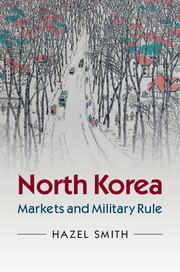Book contents
- Frontmatter
- Dedication
- Contents
- Acknowledgements
- Introduction: North Korea: politics, economy and society
- Part I Jettisoning caricatures: understanding history
- Part II The rise and fall of Kim Il Sungism
- Part III Marketisation and military rule
- 9 Marketisation from below
- 10 Military rule from above
- 11 The marketisation of well-being
- 12 The marketisation of the social structure
- 13 Going nuclear
- 14 Strategic paralysis
- 15 North Koreans as agents of change
- Bibliography
- Index
15 - North Koreans as agents of change
from Part III - Marketisation and military rule
Published online by Cambridge University Press: 05 May 2015
- Frontmatter
- Dedication
- Contents
- Acknowledgements
- Introduction: North Korea: politics, economy and society
- Part I Jettisoning caricatures: understanding history
- Part II The rise and fall of Kim Il Sungism
- Part III Marketisation and military rule
- 9 Marketisation from below
- 10 Military rule from above
- 11 The marketisation of well-being
- 12 The marketisation of the social structure
- 13 Going nuclear
- 14 Strategic paralysis
- 15 North Koreans as agents of change
- Bibliography
- Index
Summary
Government policy in North Korea hasn't changed much over the last twenty to thirty years; the mass mobilisation of the Kim Il Sung era morphed into military-first politics as the overriding objective of regime survival dominated domestic as well as foreign policies. Political freedoms remained non-existent and political reform off the political agenda. North Korean governments remained authoritarian and systematically subordinated individual human rights to regime security imperatives. Nevertheless, the breakdown in state capacity to reward acquiescence and punish dissent allowed North Koreans to carve out a space for the exercise of limited but important freedoms, especially in everyday economic decision-making.
The transformation of North Korea from a rigid command economy during the Cold War to the marketised society of today was not planned or foreseen but can be explained by understanding how North Korean people – not the government – took action by themselves, for themselves, in response to external and domestic exigencies. The self-directed activity of millions of small traders, led by women, who swapped, bartered, sold and generally engaged in the whole spectrum of non-state-directed, private economic transactions, transformed society from below and from inside; social change was not led from abroad.
In daily life, most people were forced into circumventing governmental regulations in order to find ways to survive and, in a few cases, prosper. The government's refusal to acknowledge the fundamental importance of marketisation in sustaining life and livelihoods increased the sense of dissonance between official pronouncements and real life. The failure to end economic hardship and the awareness of better living standards in China and South Korea combined to create a crisis of legitimacy for military-first governments. Strident government rhetoric directed against South Korea was partly designed to demonstrate to a domestic audience that even if North Korea was not as rich as the South, it was more legitimately Korean. Patriotism, as noted long ago by Disraeli, was the last resort of the scoundrel.
- Type
- Chapter
- Information
- North KoreaMarkets and Military Rule, pp. 327 - 332Publisher: Cambridge University PressPrint publication year: 2015



